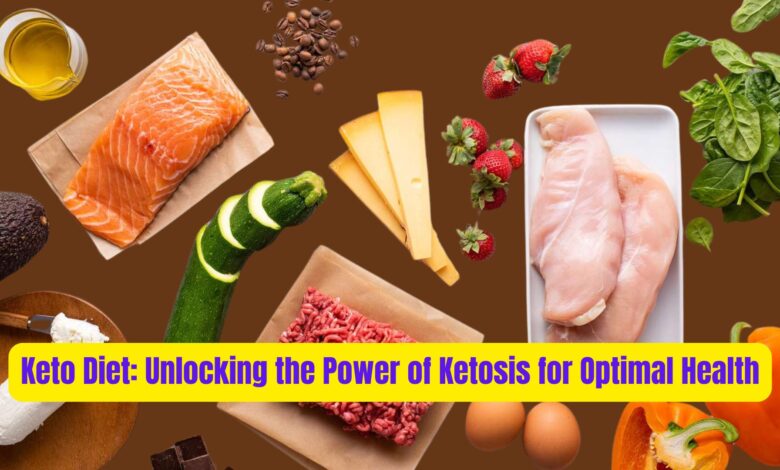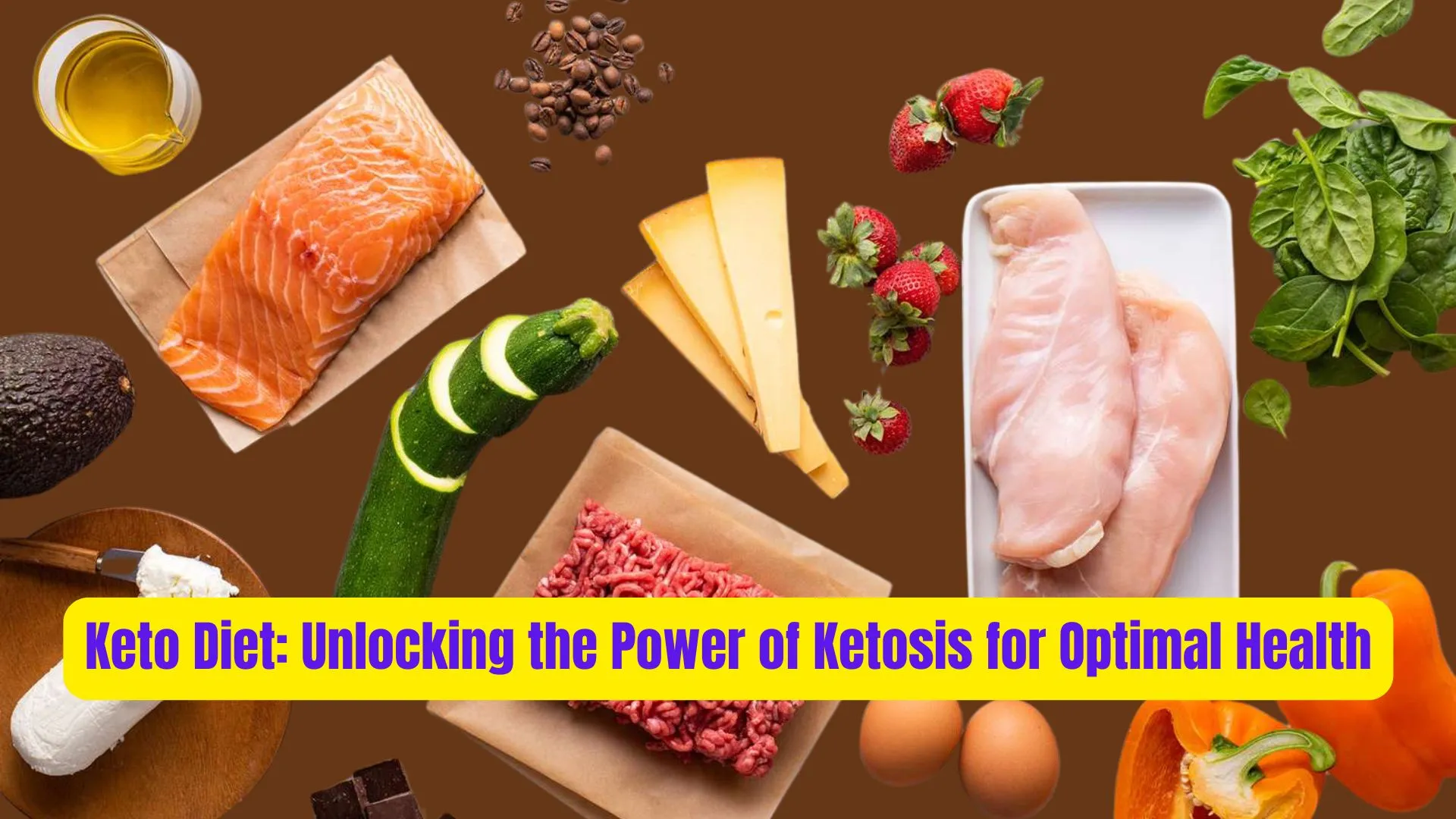Keto Diet: Unlocking the Power of Ketosis for Optimal Health


Theketo dietis a scientifically backed nutritional approach designed to help individuals shift their body’s primary fuel source from carbohydrates to fats. By following a strictlow carb diet, the body enters a metabolic state calledketosis, where it burns fat for energy, leading to various health benefits. In this article, we will explore theketo diet, its benefits, and why it has become a popular choice for many who are looking to improve their health and well-being.
What is the Keto Diet?
At its core, theketo dietfocuses on minimizing carbohydrate intake while increasing fat consumption. Typically, the body uses glucose, which is derived from carbohydrates, as its main source of energy. However, when the intake of carbs is reduced to under 50 grams per day, the body enters a state ofketosis. In this state, the liver converts fat intoketones, which are used as an alternative fuel source.
This switch from glucose to ketones can have profound effects on the body, allowing for improvedfat burning, increased energy levels, and better mental clarity. Theketo dietis not just a weight loss strategy but a lifestyle change that offers long-term benefits for overall health.
How Does Ketosis Work?
To better understandketosis, it’s important to know how the body normally processes food for energy. When you consume carbs, your body breaks them down into glucose, which is then either used for immediate energy or stored as glycogen in the liver and muscles. When you reduce carb intake, glycogen stores become depleted. The body then turns to fat as its alternative energy source.
Duringketosis, the liver converts fat intoketones. These ketones are released into the bloodstream and used by the brain, muscles, and other tissues for energy. This shift not only supports weight loss but also provides sustained energy throughout the day.
Key Benefits of the Keto Diet
1. Accelerated Fat Loss
One of the most significant reasons people turn to theketo dietis its ability to promote fat loss. By restricting carbohydrates, the body is forced to use stored fat for fuel, resulting in faster and more efficient weight loss. The process of fat oxidation is enhanced inketosis, allowing dieters to shed excess pounds without feeling hungry or deprived.
2. Enhanced Mental Clarity
In addition to physical benefits, many people on theketo dietreport better cognitive function. Thebraintypically relies on glucose for energy, but inketosis, it efficiently uses ketones as an alternative fuel. As a result, many keto dieters experience improved focus, sharper thinking, and enhanced memory.
3. Stabilized Blood Sugar Levels
For individuals struggling withblood sugar imbalances, theketo dietcan provide relief. Because this eating plan eliminates most high-carb foods, it helps regulate insulin levels and prevents sharp spikes in blood glucose. This makes theketo dieta viable option for people withtype 2 diabetesor those who are insulin resistant.
4. Appetite Suppression
Unlike many other diets that leave individuals feeling constantly hungry, theketo diethelps naturally reduce appetite.Healthy fatsandproteintake longer to digest, which helps you feel fuller for longer. The suppression of hunger hormones such as ghrelin, combined with stable blood sugar levels, makes it easier to stick to alow carb dietwithout succumbing to cravings.
5. Improved Heart Health
Though theketo dietencourages the consumption of fats, it specifically emphasizeshealthy fatssuch as those found in avocados, nuts, seeds, and oily fish. These fats help improve cholesterol levels by increasingHDL (good cholesterol)while loweringLDL (bad cholesterol). This can lead to improved heart health and reduced risk of cardiovascular disease.
The Science Behind the Keto Diet and Weight Loss
Theketo dietis an effective tool for weight loss primarily due to its ability to control insulin and shift the body intoketosis.Insulin, a hormone produced by the pancreas, plays a key role in fat storage. When insulin levels are low, the body burns more fat. Theketo diethelps maintain low insulin levels, promoting fat loss over time.
Moreover,ketosishelps maintain muscle mass, which is crucial for long-term weight management. Unlike calorie-restrictive diets that often lead to muscle loss, theketo dietpreserves lean tissue, ensuring that most of the weight lost comes from fat.
Foods to Include in a Keto Diet
To successfully enterketosis, it’s essential to consume the right balance offats,proteins, andlow-carb vegetables. Here’s a list of foods commonly included in theketo diet:
- Healthy Fats: Avocados, olive oil, coconut oil, grass-fed butter, ghee
- Proteins: Eggs, poultry, grass-fed beef, fish, and seafood
- Low-Carb Vegetables: Spinach, kale, broccoli, zucchini, cauliflower
- Nuts and Seeds: Almonds, chia seeds, flaxseeds, walnuts
- Dairy: Full-fat cheese, cream, Greek yogurt (in moderation)
It’s also important to stay hydrated and consumeelectrolytes, such as sodium, potassium, and magnesium, to avoid symptoms of the “keto flu,” which some people experience in the early stages of the diet.
Potential Side Effects and Considerations
While theketo dietoffers numerous benefits, it’s not without its challenges. Some individuals may experience short-term side effects such asketo flu, which can include symptoms like headaches, fatigue, and irritability. These are often caused by a sudden drop in carbohydrate intake and can be managed by staying hydrated and consuming enoughelectrolytes.
Additionally, it’s important to monitor overall fat quality. While theketo dietemphasizes fat intake, not all fats are created equal. It’s crucial to focus on consumingunsaturated fatsandomega-3 fatty acidswhile avoiding trans fats and overly processed foods.
Is the Keto Diet Right for You?
Theketo dietisn’t for everyone, but for those who can stick to it, the results can be transformative. From accelerated fat loss to better mental clarity and improved heart health, the benefits are clear. However, as with any dietary change, it’s important to consult with a healthcare provider to ensure that theketo dietis a good fit for your individual health needs.
If you’re ready to embark on yourketo journey, remember that consistency is key. Focus on eating whole, nutrient-dense foods, staying hydrated, and monitoring your progress to ensure you’re getting the most out of thislow carb diet.



